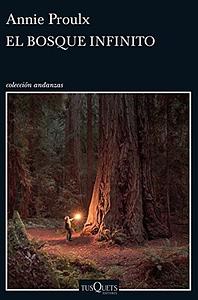Take a photo of a barcode or cover
Annie Proulx's prose is delicious to read. Barkskins is her epic about the forest industry, deforestation, conservation, disregard for our environment. Sounds pedantic, doesn't it? But not so much...we follow the lives of unforgettable characters over the course of 320 years, starting with two indentured immigrants who sailed to Canada in 1693. Following their descendants, we explore conflicts between Native Americans and immigrating Europeans. We learn about the development of the forestry industry, the beginnings of conservation, and the westward movement of pioneers. But the real treat is the characters. Proulx's skill in bringing her characters to life, and making us care deeply about with all of their strengths and flaws, made this book sail for me. It is an epic. In print at over 700 pages, get ready to spend some time with it. The genealogical charts at the back of the book are indispensable. If you are reading it on Kindle, know that the charts are there so that you don't get lost following the families. Highly recommend.
Dnf for me, i just don't have the concentration I need to finish it. The writing is fine, there are just so many characters. The book is long and it eventually became tedious. Moving on.
challenging
informative
medium-paced
Plot or Character Driven:
A mix
Strong character development:
Complicated
Loveable characters:
Complicated
Diverse cast of characters:
Yes
Flaws of characters a main focus:
Complicated
Brilliant! This is an epic story of the descendent of two young men that come to New France to work as loggers. From Nova Scotia to New Zealand to Chicago, this story spans many lifetimes, bringing to life rich characters, unexpected twists, and a haunting realization that our society, only seeing profits from bending nature to our will, is on a collision course with environmental destruction.
I really liked this book. I love long books where we look at one family for generations
I just couldn't do it. I'm about 1/3 of the way through, and still nothing to make me care about the characters or even the forest. (Okay, I care about the forest, but it's not like what's going to happen is a surprise.)
Phew. I wanted to love this so badly. I just found it to be okay. It’s long. It’s dense. It’s hard to keep track of characters. Maybe I was in a lazy period, but I really struggled to give this my attention.
But also… It’s well-written (Proulx!). The characters became more interesting as it went along, but the bright moments were separated by long slogs. This IS a story that isn’t commonly told, however (I can think of few other stories of logging fortunes) and it was a major part of our continental history.
But also… It’s well-written (Proulx!). The characters became more interesting as it went along, but the bright moments were separated by long slogs. This IS a story that isn’t commonly told, however (I can think of few other stories of logging fortunes) and it was a major part of our continental history.
Gave this book a good try - but had to quit about halfway through. The beginning was promising. The characters develop, you really get a sense of the environment, etc. However, just as you get to know them - they are gone. After that point - character development is lacking, which is understandable - as there are SO many. I just couldn't get invested in so many people; they'd be gone as soon as I was starting to get a sense of who they were.
This book is so organic and timeless. Proulx takes on the Herculean task of tracing the descendants of two destitute French boys, Sel and Douquet, who come to new Canada to clear the land. Over 3 centuries, the families evolve, taking different paths-one family becoming quite Americanized whilst the other loses their land and their native heritage. Their journeys take them from Nova Scotia to Boston to France, London, Amsterdam, to New Zealand, to China, to the Amazon, to the American West (and Boston when it was the wild west!). This is not only a story of the families, however. It is also the story of how timber and wood built the new world. From land clearing, to timber for shipping and housing, to deforestation and its devastating affects, to the quest for exotic woods, to efforts at conservation, too little, too late. This is probably the richest book Proulx has written. The most difficult task for her was to allow subplots to just die when some of the characters themselves died-that realism is difficult for an author to achieve while keeping the story going, but it's even more difficult for the reader to believe because we don't want the book to be too real, which it is at times. We aren't given a pretty picture to remember. She's delivering historical truth, fairly objectively because of the balance she creates through her characterization. I'm so glad I read it. Fans of Mitchner will especially enjoy.




